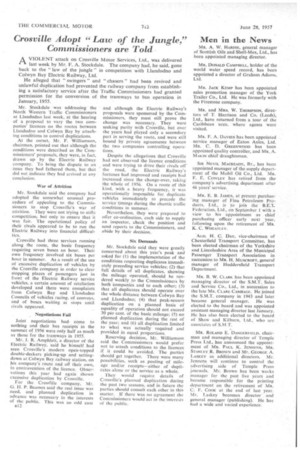Crosville Adopt "Law Of the Jungle," Commissioners are Told
Page 46

If you've noticed an error in this article please click here to report it so we can fix it.
A VIOLENT attack on Crosville Motor Services, Ltd., was delivered last week by Mr. F. A. Stockdale. The company had, he said, gone back to the "law of the jungle" in competition with Llandudno and Colwyn Bay Electric Railway, Ltd.
He alleged that " swingers " and " chasers " had been revived and unlawful duplication had prevented the railway company from establishing a satisfactory service after the Traffic Commissioners had granted permission for the conversion of the tramways to bus operation in January, 1955.
Mr, Stockdale was addressing the North Western Traffic Commissioners at Llandudno last week, at the hearing of a proposal to vary the two companies' licences on the routes between Llandudno and Colwyn Bay by attaching conditions to control duplications.
At the outset. Mr. F. Williamson, chairman, pointed out that although the conditions were described as the Commissioners' proposals, they were, in fact, drawn up by the Electric Railway company. To bring the dispute to an issue they had fathered them, but that did not indicate they had arrived at any conclusion.
War of Attrition
Mr. Stockdale said the company had adopted the somewhat unusual procedure of apPealing to the CommisSioners to stop Crosville's war of attrition. They were not tiying to stifle competition, but only to ensure that it was fair. The operational policy of their rivals appeared to be to run the Electric Railway into financial difficulties.
Crosville had three services running along the route, the basic frequency requiring seven buses an hour. Their own frequency involved six buses per hour in summer. As a result of the use of excessive duplication of vehicles by the Crosville company in order to clear stopping places of passengers just in front of the Electric Railway service vehicles, a certain amount of retaliation developed and there were complaints from Colwyn Bay and Llandudno Councils of vehicles racing, of convoys, and of buses waiting at stops until rivals appeared.
Negotiations Fail
Joint negotiations hadcome to nothing and their bus receipts. in the summer of 1956 were only half as much as those for the tramways in 1955.
Mr. J. R. Amphlett, a director of the Electric Railway, said he himself had seen Crosville's modern open-topped double-deckers picking-up and settingdown at Colwyn Bay railway station,.on his company's route and off their own, in contravention of the licence, Observations this year had again shown excessive duplication by Crosville.
For the Crosilille company, Mr. G. H. P. Beames said the real issue was need, and planned duplication in advance was necessary in the interests of the public. This was an odd case B12 and although the Electric Railway's proposals were sponsored by the Commissioners, they must still prove the change was necessary. They were seeking parity with Crosville, but over the years had played only a secondary part in serving the route, and were still bound by private agreements between the two companies controlling operations.
Despite the allegations that Crosville had not observed the licence conditions and were trying to drive their rivals oil' the road, the Electric Railway's fortunes had improved and receipts had increased since the change-over, taking the whole of 1956. On a route of this kind, with a heavy frequency, it was operationally impossible for, duplicate vehicles immediately to precede the service timings during the chaotic traffic conditions in summer.
Nevertheless, they were prepared to offer co-ordination, each side to supply an inspector, check the position and send reports to the Commissioners, and abide by their decision.
Six Demands
Mr. Stockdale said they were greatly concerned about this year's peak and asked for (1) the implementation of the conditions respecting duplicates immediately preceding service vehicles; (2) that full details of all duplicates, showing the mileage operated, should be rendered weekly to the Commissioners by both companies and to each other; (3) that all duplicates should operate over the whole distance between Colwyn Bay and Llandudno; (4) that peak-season duplication on a planned basis of equality of operation should not exceed 30 per cent, of the basic mileage; (5) no planned duplication during the rest of the year; and (6) all duplication limited to what was actually required and provided in equal proportions.
Reserving decision, Mr. Williamson said the Commissioners would prefer not to attach conditions to the licences if it could be avoided, The parties should get together. There were many possibilities, such as pooling of mileage and/or receipts7-either of duplicates alone or the service as a whole.
They would require details of Crosville's planned duplication during the past two seasons, and in future the parties should consult each other in this matter. If there was no agreement the Commissioners would act in the interests of the public.








































































































































